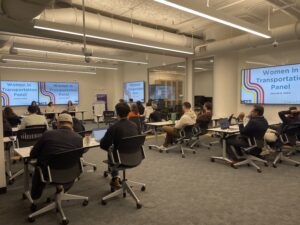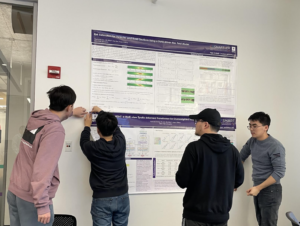LinkedIn LinkedIn LinkedIn Meet 2023-24’s Women in Transportation The Women...
Read MoreThe C2SMART Center Student Learning Hub, launched in 2020, aims to provide the student community a platform for applied learning, skill building, and job preparation. Taught and attended by students, the SLH is designed to be an engine for professional development and peer networking for students from all walks of life. 85% of our instructors are Graduate students, but a set number of instructor spots are held for undergraduates to gain teaching experience. Courses cover topics including transportation, artificial intelligence and machine learning, cyber security, and skills like programing, data visualization, and geographic information science.
In addition to training and skill building, the Student Learning Hub provides our graduate students to explore career options and build a professional network through our What’s the Chatter? event series, which connects students directly to industry partners.
“The Student Learning Hub was always meant to be a student-driven, student-led, and student-focused platform,” says SLH Coordinator Dr. Jingqin Gao. “To that end, it provides not only invaluable skill building for students looking to work in in the transportation industry private sector – granting access
to programs and software which might otherwise be prohibitively expensive for students to learn – but also teaching and curriculum-building experience for those researchers looking to move into academia and professorship in their careers.” The SLH is designed to be an engine for professional development and peer networking for students from all walks of life. 85% of our instructors are Graduate students, but a set number of instructor spots are held for undergraduates to gain teaching experience. Courses cover topics including transportation, artificial intelligence and machine learning, cyber security, and skills like programing, data visualization, and geographic information science.
The Student Learning Hub grew rapidly during the Fall 2021 semester, with training offered on blockchain, cybersecurity, computer vision, Python, ArcGIS, and research applications for virtual reality. Attendees included members of NYCDOT, NYSDOT, Westchester County Government, and Lyft/Citi Bike.
Looking ahead, our goal is to expand our breadth of topics to become more multidisciplinary, and to open teaching opportunities beyond C2SMART to our other university partners to help supply a fast-growing workforce with research- and job-ready skills.
Registration for upcoming classes has opened. Certificates of completion are offered for courses that have multiple sessions; for one-session courses, they are available upon request.
- Hands-On Tutorials for Amazon Web Services (AWS) – Friday, Feb 25, 2022 at 2:00 PM – 3:00 PM ET – RSVP now
- Create Your First Interactive Data Dashboard Using Plotly Dash – Friday, Mar 4, 2022 at 2:00 PM – 3:00 PM ET – RSVP now
- Ramp metering: Control Strategies and New Insights – Friday, Apr 1, 2022 at 1:00 PM – 2:00 PM ET – RSVP now
- Advanced Computer Vision: Object Detection & Tracking – Sign up to be notified
- Getting Started with Android Development – Friday, Apr 22, 2022 at 1:00 PM – 2:00 PM ET – RSVP now
Students who wish to submit a course idea or request should do so at this form. We accept submissions on a rolling basis.
Past Programming
Instructor: Omar Hammami, New York University
As blockchain continues to grow in popularity, another type of distributed ledger is gaining traction as well: enterprise grade distributed ledgers. This session will give an overview on enterprise grade distributed ledgers, answering the questions on how they work, and when to use them. A tutorial using Hyperledger Fabric will also show how we can create and interact with our own traffic specialized distributed ledger, to demonstrate a real use case.
Instructor: Yu Hu, New York University
The Introduction to Cybersecurity and its application in Transportation will help you to discover essential knowledge, skills, key elements and topics in cybersecurity. We will briefly discuss the history of security analysis of modern automobiles and the need for cybersecurity including typical threats and potential solutions.
Instructor: Srushti Rath, New York University
In this session, students learned the basics of text representation in natural language processing (NLP) and various state-of-the-art NLP techniques for (semantic) textual similarity tasks. The session walked through data preparation and processing steps with language modeling tools in Python (e.g., Doc2Vec, Sentence-BERT) for computing text/document similarity and discussed several practical applications of such NLP techniques in transportation related downstream tasks.
Instructor: Chenxi Liu, University of Washington
This session provided students with a foundational understanding of Computer Vision (CV) technology including the basic knowledge about image processing. Also, a simple Convolutional Neural Network (CNN) was mentioned in the session to demonstrate traffic sensing based on image data. The session required basic knowledge about python.
Instructor: Alex Wen, New York University
This series provided a brief introduction to ArcGIS by teaching the basics of geographical visualization and preliminary spatial analysis. The first session introduced the user interface and taught the basics of map design; the spatial relationship between pedestrian traffic and pavement quality was explored. The second taught students about the basics of data management (e.g., data cleaning, attribute filtering) and briefly introduced ArcPy (Python in ArcGIS).
Instructor: Zhengbo Zou
This session provided students with a foundational understanding of the use of virtual reality in construction, with a focus on construction safety at work zones. It focused on state-of-the-art implementations of virtual reality in the construction domain, and how it could be used to carry out user experiments when dangerous situations are to be simulated for construction safety studies. Finally, students learned through example of how to create a virtual reality model from an existing building information model.
Instructors: Fan Zuo & Sha Di
Traffic simulation is the mathematical modeling of transportation systems through the application of computer software to better help plan, design, and operate transportation systems. In this course, students got to know the extensive functions of an open-source, highly portable, microscopic, and continuous road traffic simulation package, Simulation of Urban MObility” (SUMO), which is designed to handle large road networks.
Register for access to video recording of Session 1.
Instructor: Suzana Duran Bernardes, NYU
This session was intended for newcomers to data visualization. The program demonstrated best practices for data visualization and data storytelling with examples from real world cases. Students generated powerful visualizations and dashboards of common data analyses that will help people understand and make decisions based on their data.
Instructor: Gyugeun Yoon, NYU
Transit systems are essential to modern urban communities to fulfill the travel demand within or between regions. This course covered two aspects of how transit systems have developed: 1) a description of different types of transit operation systems, and 2) an introduction to how to use the open-source simulation (written in MATLAB) shared with the public via Github (https://github.com/BUILTNYU/
Instructor: Chan Yang, Rutgers University, Rutgers Infrastructure Monitoring and Evaluation (RIME) Group
Nowadays, bridges are everywhere, establishing connections between different lands and expediting communications. In the field of bridge engineering, designing a new bridge and evaluating an existing bridge are equally important. This session provided students with a fundamental understanding of structural health monitoring (SHM), with a focus on the modeling technique using Abaqus software.
Instructor: Dr. Yueshuai (Brian) He, New York University
This workshop provided a detailed introduction to the MATSim-NYC model developed by C2SMART Center and taught students how to extend the base model to incorporate new scenarios as well as how to duplicate the development of the model to other cities. The MATSim-NYC model is a city-scale simulation test-bed to evaluate emerging technologies and policies with a common platform. Participants will gain hands-on example data and scripts from the model and practice input preparation and output analysis.
Instructor: Suzana Duran Bernardes, New York University
The session introduced learners to data science through the Python programming language and fundamental programming concepts including data structures, basic operations in Python, Pandas library for data analysis, and Matplotlib for data visualization. Students used Jupyter Notebook to create their own programs for data retrieval, processing, and visualization.
Instructor: Zilin Bian, New York University
This session will provided students with a foundational understanding of machine learning models (isolation forest, decision tree, neural network etc.) as well as demonstrate how these models can solve complex problems for smart cities.
Instructor: Jingxing Wang, University of Washington
This session introduced approaches to collect open-sourced transportation data for related research. Students used Google API travel time data collection as an example to demonstrate how such real time travel time data was collected and used for traffic performance analysis in the greater Seattle area during the COVID-19 pandemic.
Related Posts
Application for Fellowship Funding in NYU Transportation Systems Graduate Program
Are you an incoming graduate student to NYU’s MS in...
Read More6th Annual Women in Transportation Panel
March 11, 2024 To celebrate Women’s History Month, C2SMARTER, the...
Read MoreCUNY City Tech/NYU C2SMARTER Poster Presentation & Social
March 5, 2024 In early March, C2SMARTER’s NYU contingent hosted...
Read More



